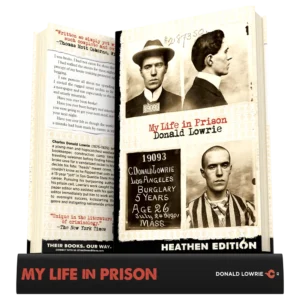No products in the cart.

9009
Spine #99
Author
Hopper & Bechdolt
Translator
First Edition
1908
Heathen Edition
November 2, 2022
Refreshed
Pages
142
Heathen Genera
Convictions
Paperback ISBN
978-1-948316-99-6
Hardcover ISBN
978-1-963228-99-1
A terrific feeling of power had risen through him. Once, in this prison, he had been a man intent on obedience; months had changed him to a sullen suspicious convict; years had made of him a crouching, stalking beast; and now, at the touch of this rifle, he sprang up a monster. His muscles were of steel, his nerves were of iron; he was sure of himself, absolutely sure. He felt that he could kill, that no one, not God Himself, could keep him from killing. He could kill when he pleased. He could not miss, of that he was incredibly sure; in his arms, already, in his arms, in his eye, in his trigger-finger, he had the feel of the coming kills.
James Hopper (1876–1956) was an American footballer, journalist, and author, penning some 450 short stories and six novels, one of which he co-authored with fellow journalist and author Frederick Ritchie Bechdolt (1874–1950). Inspired by true events, their unsentimental “fact-story” tells of John Collins, 9009, a convict fully deserving of his sentence, who enters prison with the sincere hope that he can make good. What he discovers, however, is a wholly corrupt system hell-bent on breaking him little by little, injustice by injustice, until he erupts with a calculated, bloodthirsty vengeance.
Test Your Might
Paperback
OTHER RETAILERS
Rate & Shelve It
Hardcover
OTHER RETAILERS
Rate & Shelve It
"It is painfully realistic."
The New York Times
Heathenry
Contents
Praise
Details
Heathenry
What a book! This thing simmers until it explodes, and when it does—watch out. It’s credited to two authors—James Hopper and Fred R. Bechdolt—but research has led us to agree with H. L. Mencken: Hopper was likely the author, with Bechdolt supplying the facts.
What immediately stands out is Hopper’s lean, stripped-down writing style. There is no fat on this thing: it’s brisk, brash, and brutal. Need more alliteration? It’s also electric, economical, and efficient. We Heathens are big fans of Donald E. Westlake’s Parker series that he penned as Richard Stark, and Hopper feels very much like a precursor—emphasis on the stark. Westlake kicked around in that noir, antihero sandbox made popular by the likes of Raymond Chandler and Dashiell Hammett, but this book is proof Hopper was building a sandcastle there long before they arrived—which is to say 9009 was pulp before there was pulp.
At the same time, though, it’s a scathing indictment of the American penal system as it existed at the turn of the 20th century. In their preface, Hopper and Bechdolt make it clear that everything that happens in 9009 is “something which has happened to some convict in some prison some time.” While that statement may sound engineered in order to lend their novel some based-on-fact validity, we Heathens are knee-deep in production on a whole gaggle of autobiographies/prison reform books authored by Donald Lowrie, Thomas Mott Osborne, Ed Morrell, and Jack Black, among others (we’re calling it our Convictions series), and we can emphatically state that when they say it’s based in truth—we believe them. Lowrie’s first book, My Life in Prison, is full to the brim with prison absurdities. Then, Morrell sees his absurdities and raises him several insanities in his own The 25th Man. Jennings, this story’s antagonist, could easily be a real-life character in either of their books.
But, maybe it’s not enough for them to say it’s based on facts and for us to say we believe them. We can hear the challenge now: where’s the proof?
You want proof?
We’ve got proof.
9009 borrows many of its elements from the prison break perpetrated by Harry Tracy (prisoner #4088) and David Merrill (#4089) from the Oregon State Penitentiary on June 9th, 1902. And rather than expound on the similarities and spoil both stories for you, we have included an account of that escape (with images)—as detailed in the book Sensational Prison Escapes From The Oregon State Penitentiary published in 1922 by Prisoner #6435—so you can draw your own conclusions on what is fact and what is fiction.
As for the text, we’ve kept our Heathening to the bare minimum given how modern Hopper’s writing reads as-is. The only modifications we’ve made have been in updating a few words to their current equivalents (e.g. cell-mate is now cellmate, shot-gun is now shotgun, etc.), which we’re pleased to report makes this ripping tale rip faster.
Ready?
Go!
Check out Hopper’s story about his first writings here: Writers on Writing: James Hopper
Contents
Heathenry: Thoughts on the Text
9009
The Tracy-Merrill Escape
9009
The Tracy-Merrill Escape
Praise
“It is painfully realistic.” —The New York Times
“Almost too terrible in its realism is the story of a convict ‘9009’ by James Hopper and Fred R. Bechdolt. It is the kind of story which makes the reader on fire against the injustice of justice.” —The Graphic
“Put into commonplace language, without hysteria, it is a protest against the American penal system.” —The Saturday Review
“Very real, very dramatic, and most tragical in its ending.” —The Book News Monthly
“Achieves a bone-chilling effect by consistently using ‘9009’ as the name of the protagonist.” —H. Bruce Franklin, Prison Literature in America
“From cover to cover, a book of horror and grim, relentless realism. A fact-story, 9009 might have been a collaboration of Poe, Hugo, and Oscar Wilde.” —Sunset
“The book is the heaviest blow that has been struck the prison system since Oscar Wilde’s The Ballad of Reading Gaol.” —Newark Call
“A story of prison life, authentic as to fact, that will prove a great sensation in its startling revelation of the present management of prisons.” —The Publishers’ Weekly
“A book decidedly out of the ordinary . . . a remarkable story. It is an intricate psychological study of an imprisoned man and an appalling indictment of our prison systems. Aside from the artistic value of the book, the sweep of the facts which it presents is staggering. As has been well said, 9009 is a question which must be answered.” —Janet B. McGovern, The Los Angeles Times
Details
9009
Heathen Edition #99Format: Paperback
Interior: Black & White on Cream Paper
Pages: 142 (+2 POD)
Language: English
Annotations: 36 Footnotes
Illustrations: 6
The Heathen Newsletter
Want to be kept in the loop about new Heathen Editions, receive discounts and random cat photos, and unwillingly partake in other tomfoolery? Subscribe to our newsletter! We promise we won’t harass you – much. Also, we require your first name so that we can personalize your emails. ❤️
@heatheneditions #heathenedition
Copyright © 2026 Heathen Creative, LLC. All rights reserved.




